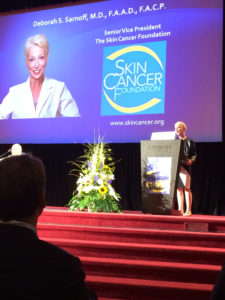Affecting more than one million people in the U.S. every year, skin cancer is the most common form of cancer. When caught early, skin cancer is treatable, but may leave your skin with unwanted scars. Seeking out a skilled cosmetic surgeon can help maintain the integrity of your skin.
Patients who have been diagnosed with skin cancer may be candidates for skin cancer removal. Skin cancer removal may used for:
Once the skin cancer has been removed, the healed skin should match the area around it and create a natural, smooth appearance. When at all possible, incision lines will be hidden with the natural contours of your body.
For more extensive forms of skin cancer, Mohs surgery may be necessary to remove all traces of cancer. Mohs surgery reconstruction is highly technical and may require more than one procedure to achieve optimal results.
For basic lesions, surgical removal using a small incision can be performed under a local anesthetic. An incision is made around the lesion and the lesion is removed. The incision is then closed using fine sutures. A surgical dressing will be placed over the treatment area following surgery.
More advanced techniques such as skin or tissue grafts may be needed to reconstruct large wounds. During these procedures, a portion of healthy tissue is removed from a donor site on your body and transplanted to the treatment area. The donor site can be taken from any part of your body. In most cases, it is taken from an area that is usually concealed under clothing. Incisions will be closed with small stitches and surgical dressings will be applied.
Immediately following treatment, your skin will be swollen, red and likely draining fluid. Surgical drains may be used to collect this excess fluid. You may experience some discomfort for several days in the treatment area. Your surgeon will provide you will pain medication. Bandages are typically removed in a few days, and stitches in one week.
In most cases, you should be able to resume normal activities right away, or within 1-2 days. More extensive procedures will require some downtime. These details will be discussed during your consultation. It is important to protect the treatment area from direct sun exposure for several months. Incisions will take 12-18 months to fade and flatten.

Dr. Sarnoff addresses an international audience about the dangers of the sun and photoaging at The World Congress For Cancers of the Skin.
Most people have a number of small colored spots on their bodies – moles, freckles, birthmarks. Almost all moles are normal and remain so. However, a change in a mole or spot on the skin may be the first sign of skin cancer and should be checked immediately by a dermatologist.
Chronic exposure to sunlight.
Basal cell carcinoma is the most common form of skin cancer. These cancers arise in the basal cells, which are at the bottom of the epidermis (outer skin layer). Squamous cell carcinoma is the second most common skin cancer. Malignant melanoma is a serious skin cancer that arises in moles or in the tanning cells of the skin. All types of skin cancer are treated at Cosmetique.
Mohs micrographic surgery is a state-of-the-art treatment for skin cancer. It relies on the precision and accuracy of a microscope to trace and ensure removal of skin cancer – down to its roots. Dr. Sarnoff specializes in Mohs surgery, which provides the highest cure rate and, along with Dr. Gotkin’s plastic surgery, the best cosmetic result.
Mohs surgery is effective for most types of skin cancer, but is most commonly used to treat basal and squamous cell carcinomas. Mohs surgery is the treatment of choice when: the cancer is large; the edges of the cancer cannot be clearly defined; the cancer is in an area of the body where it is important to preserve healthy tissue; and/or if prior treatment has failed. High precision makes Mohs surgery ideal for the elimination of cancers in cosmetically important areas such as the face (nose, eyelids, lips, hairline), hands, feet, and genitals.
Protect yourself from the sun (protective clothing, sunscreen, sunglasses); be aware of any new or existing lesions on your skin that appear to be growing or bleed intermittently. If any of these skin changes occur, you should schedule a consultation with Dr. Sarnoff as soon as possible.
Call 212.794.4000 today to make an inquiry or schedule a confidential appointment at our Manhattan Office.
For Long Island, please call 516.484.9000.
"Knowing that Dr. Sarnoff is Senior Vice President of The Skin Cancer Foundation instilled a sense of trust which I had not felt with any other dermatologist."
